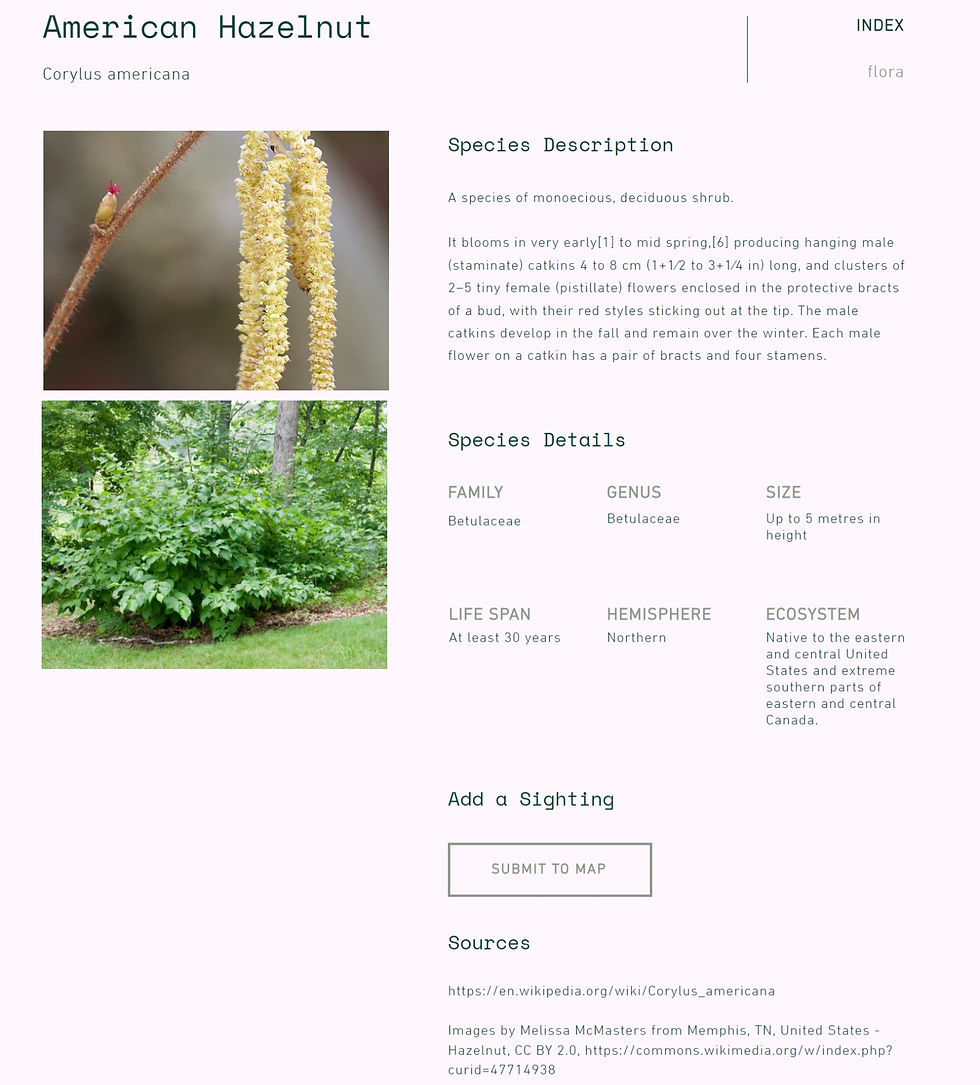Another Mother: A Database of All Trans Species on Earth
- Eli Brown
- Jan 24
- 4 min read
Updated: May 8
Keywords: databases, trans, organisms
Abstract
Another Mother is an online database where users search for species of plants, fungi, and animals who express multiple sexes, and record sightings of species on an interactive map. Through observation and tracking, users gain insight into the complex ways in which the natural world has been utilizing transsexuality as an evolutionary strategy for hundreds of millions of years.

The Project
Another Mother is a database that honors and provides space for the many species of plant, animal, and fungi who exhibit the following as evolutionary survival strategies:
-multiple sexes
-reproductive diversity
-non-heterosexual mating rituals
This resource can be searched freely and encourages the user to seek out and learn about these individuals by uploading their findings on a map.
The database began as a response to an open call by the University of Pennsylvania program in Environmental Humanities called The Ecotopian Toolkit to address water justice in the Delaware River Watershed. The public workshop, exhibition, and catalog were sponsored by the Independence Seaport Museum.

History of the Database
What are the structural mechanisms keeping this myth alive? Who are the scientific gatekeepers and what is at stake? We are not taught that there are ‘trans’ species. If we were, what might happen to our collective consciousness?
Another Mother began in 2014 as an educational zine, called Transplants, which developed out of a desire to prove that queerness and transness, for lack of better words, existed in the plant world―and that many plants were “trans.” I use the term ‘trans’ to refer to plant bodies, but in truth, there is no word to describe what is actually happening in plant reproductive behavior. Although botanists still utilize the terms, ‘male’ and ‘female’ to describe a plant’s reproductive parts, this language is a projection of human anatomy onto non-human beings and has no real meaning. Since we don’t share a language, we can’t know how plants, animals, or fungi understand gender, if at all.

Transplants
Like many queer and trans people, I often yearn for language which does not exist, in order to describe elusive phenomena about my experience of the world that feel important. With some hesitation, I'll use the term 'trans', in quotes, to describe plants whose reproductive expressions are complex and switchy. Perhaps a new word is on the horizon.
I learned that some plants were ‘trans’ in 2013 in the UC Santa Cruz Organic Farming and Sustainable Agriculture apprenticeship program. This is a 6-month-long training program where participants live and work closely with 50 people, and learn the science, history, and techniques of organic farming while studying food system and food justice frameworks. During one of our botany workshops, I learned that many plants have flowers with both “male” and “female” reproductive parts (pistil and stamen). These flowers are known in the world of botany, as “perfect.” This piece of information was especially inspiring and validating for me, as a trans person who farms.

I started thinking about "where our food comes from" on a whole new level - like, these organisms are ancient, they predate us as human beings and they contain genetic information which allows them to adapt to dramatic shifts in temperature and environment. Part of their strength, part of why they still exist through climate change here on earth is their ability to change what I’m perceiving as their “gender” (but what is actually something that I will most likely never understand), to maximize their reproductive capacity.
Receiving validation in my transness through the natural world is something I had not expected to receive. I wondered how it was possible that I had been working so closely with plants for so long and not known these things, and I wondered what else I didn’t know.
References
Brown, Eli. “Home.” Another Mother. https://www.anothermother.co.
About the Artist
Eli Brown is an interdisciplinary artist and farmer whose work in queer ecologies spans sculpture, drawing, writing, social practice, and public art. His practice revolves around learning trans-ness as a lineage which is not always human. Their research is often into natural history, science fiction, agriculture, and trans theory. Eli's work employs queer symbolism, utopian architecture, and scientific equipment, often in combination with the cultivation of biological materials, to make sculptural installations at various scales. Their projects are often speculating about the current and future state of interspecies relationships, queer and trans reproduction, and collective survival.
Eli's work has been exhibited at the deCordova Museum Biennial, distillery gallery, Flux Factory, and Creative Time X. In 2022, their sculpture installation commissions were on view in Lopresti Park, in Boston, MA and at Franconia Sculpture Park, in Fraser, MN.
Exhibitions and public projects have received press through Sculpture Magazine, CULTURED, WGBH’s Open Studio, and Chronicle 5 News. Within the past two years, Eli has received funding from Collective Futures Fund/The Andy Warhol Foundation, University of Pennsylvania’s Ecotopian Toolkit Project, The Luminary, and New England Foundation for the Arts.
Their writing and work have been published in the UK-based publication, Antennae: The Journal of Nature in Visual Culture, and the upcoming Routledge's Artists and The Practice of Agriculture, the long-running, queer, sex-ed comic, Not Your Mother’s Meatloaf, as well as the self-published, internationally-distributed zine, Transplants.
Eli received an MFA from SMFA at Tufts in 2018. Since then, they have taught courses at Montserrat College of Art, Maine College of Art and Design, and UMass Lowell. They are currently in collaboration with artist Rian Ciela Hammond on the web project, Another Mother: A Database of All Trans Organisms on Earth.
Citation
Brown, Eli. 2024. “Another Mother: A Database of All Trans Species on Earth.” TSQ*Now, Transgender Studies Quarterly 11, no. 4. http://www.tsqnow.online/another-mother-a-database-of-all-trans-species-on-earth



Comments